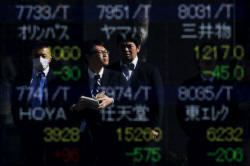|
'Sell in May and go
away'? Not this year, as stocks power ahead in third
quarter
 Send a link to a friend
Send a link to a friend
 [September 28, 2016]
By Jamie McGeever [September 28, 2016]
By Jamie McGeever
LONDON
(Reuters) - Investors following the stock market maxim "Sell in May and
go away" will be ruing that decision this year, after emerging market,
Japanese and euro zone equities emerged as the biggest winners in the
third quarter.
U.S. equities did less well but were still firmly into gains.
There are signs that the coming quarters may not be as robust, but for
the third, the prospect of central banks keeping the stimulus taps open
for longer following Britain's shock decision in June to leave the
European Union boosted investors' risk appetite and demand for
higher-yielding assets like stocks.
The British pound extended its Brexit-driven losses against the dollar,
falling more than 3 percent.
Brent crude oil was the worst performing asset, down more than 7 percent
and giving back some of the second quarter's 30 percent gains. This
caused commodities in general to fall almost 5 percent.

A Reuters graphic -- http://reut.rs/2doKMRd -- tracking 23 markets
across all geographical regions and asset classes shows the divergence
between stocks, which were the best performers, and sterling and
commodities, which were the worst.
Japanese and emerging market equities added just under 10 percent in the
third quarter, in dollar terms, and euro zone equities rose just under 6
percent .
U.S. stocks were up 3 percent
Investors drew comfort from the perception that markets continue to have
the implicit - and increasingly explicit - backing of the world's major
central banks.
The Bank of England cut interest rates to a new record low and expanded
its dormant quantitative easing bond buying aerogramme in response to
the Brexit vote. The Federal Reserve held off U.S. raising rates, the
Bank of Japan unveiled new easy policy plans and expectations remained
high that the European Central Bank would ease policy further.
SEARCHING FOR YIELD
Sterling fell to its lowest in over 30 years against the dollar shortly
after the Brexit vote. It staged a mini revival in August, but this week
fell back below $1.30 within sight of the July low just under $1.28 <GBP=>.
The fall in stock market volatility <.VIX> paved the way for higher
equity prices. Bond market volatility was also anchored for most of the
three months to September, although bonds struggled to replicate
anything like their performance in the preceding quarter.

[to top of second column] |

People are reflected in a display showing market indices outside a
brokerage in Tokyo, Japan, February 10, 2016. REUTERS/Thomas
Peter/File Photo

"The
third quarter was remarkably stable, which felt a little unnatural. You can't
expect that to continue," said Lukas Daalder, chief investment officer at Robeco
Investment Solutions, which has 267 billion euros ($299.09 billion)of assets
under management.
High yield bonds <.MERHW00> also performed well, up almost 5 percent over the
quarter, as the increasingly difficult 'hunt for yield' forced investors into
the less liquid and riskier areas of the investment universe.
The
fourth quarter could be a lot more volatile thanks to a deteriorating global
economic environment, sluggish corporate earnings and rising political
uncertainty around the U.S. presidential election in November.
Underlining that growing sense of unease and caution, HSBC's asset allocation
team earlier this month put 17 percent of its portfolio into cash, a high number
in its own right but especially high considering it was previously zero.
And according to Bank of America Merrill Lynch, investors have poured $158
billion into bond funds this year and pulled $138 billion out of equity funds, a
sizeable redemption entirely down to the $143 billion withdrawn from developed
market stock funds.
That said, if markets lurch too low too quickly for whatever reason, investors
will no doubt be hoping that the familiar cavalry rides to their rescue once
again.

"Central banks seem to be losing credibility, but everyone still looks to the
central banks. And ultimately, you should never underestimate the power of the
central banks, because in the end they can buy everything," said Robeco's
Daalder.
(Reporting by Jamie McGeever; Graphic by Vikram Subhedar; Editing by Jeremy
Gaunt)
[© 2016 Thomson Reuters. All rights
reserved.] Copyright 2016 Reuters. All rights reserved. This material may not be published,
broadcast, rewritten or redistributed. |